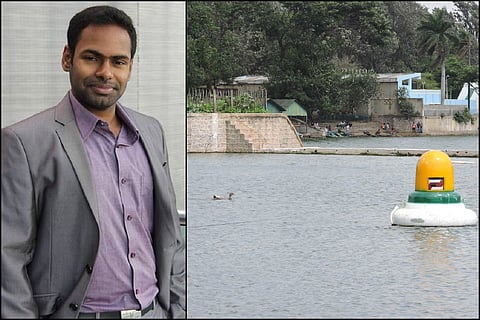

Bengaluru’s lakes often make news and not for the right reasons. Sometimes they catch fire, sometimes they house toxic foam and other times, display disturbing fish kill. But two city-based techies have come up with Elemento Aqua, a floatation device which, apart from identifying if contaminants are going into the water untreated, also monitors the oxygen levels in the lake.
Elemento Aqua is a product of Tetherbox Technologies, the brainchild of 25-year-old engineers Safeer Usman and Gopinath Anandan. While they had been trying to collaborate with the Karnataka government to install the devices in the lakes earlier, the process received a shot in the arm only after the Ulsoor fish kill incident in May this year.
Tetherbox collaborated with another green start-up called Ecogenetech, whose device diffuses oxygen into the water. Safeer explains that by installing Elemneto Aqua inside each Ecogenetech device, the former can provide data about how much dissolved oxygen is there in the water and accordingly, Ecogenetech's device will pump the required amount into the lake water.

Seeing the viability of this model in preventing further harm to aquatic life, their first pilot took off by early June with three devices in Ulsoor lake monitoring its oxygen levels. Last week, they undertook their second pilot at Vrishabhavathi Valley on the outskirts of Bengaluru and in the coming weeks, they plan to install devices in the Bellandur lake as well.
Elemento Aqua however, was initially meant for sewage treatment plants – both industrial and domestic. Working on a big data platform called Hadoop, the device collates data about the contaminants and their quantity, and sends it to the client. This shows if certain pollutants are still present in the waste water released into the storm water drains and pinpoints the cause of the pollution in the lakes.
“While some people approached us solely so that they meet governmental regulations of waste water disposal, many other industrialists and townships came forward because they genuinely wanted to address the problem,” says Safeer.
Safeer and Gopinath came up with the idea for Elemento Aqua around March last year when they connected with HS Shankar, a former IIT professor in Mumbai and the founder of Vision Earthcare, a green technology firm. It was the endeavour to understand the operational issues with Shankar’s sewage disposal technology that compelled Safeer and Gopinath to get to the root of the problem.
While Shankar simply asked them to design a robotic arm to clear away the sludge, Gopinath and Safeer wanted to eradicate the sludge itself. And so, the idea of Elemento Aqua was formulated overnight and presented to Shankar’s team. “It was about a device which would check levels of oxygen and other pollutants and send the data to the client via SMS. But we only came up with it in one night so obviously, it didn’t work the next day,” recalls Safeer.
Determined to work on the idea further, the duo returned to Bengaluru and began researching about the market for their product. In May 2015, they displayed their idea at a Mumbai event called ‘Everything About Water’, a trade show for clients looking for water related solutions. It was there that they generated the most buzz around Elemento Aqua and received contacts and enquiries from about 200 people.
But like any start-up, finances were scarce. And when the money came, there was another problem. “One day we were just sitting at a tea shop in Bengaluru, when a client from Mumbai called us saying he was interested in investing. We said we’d call him back, came up with the name Tetherbox and the cheque arrived two days later. But we couldn’t redeem it because we weren’t registered as a company!” recounts Safeer.
Finally, Tetherbox was registered as a company last December and until now, they have over 70 clients in Chennai and Mumbai, most of whom are textile, automobile and chemical industries. Safeer says they plan to expand their market to over 700 by the next financial year.
Drawing remuneration from their industry clients, their agreement with the Karnataka State Pollution Control Board has not been monetized so far – that will happen only if their pilot runs are successful. And while the output has been good so far, they are still working to meet the standard of water quality as required by the state government.
However, Safeer says that revenue generation is not his first priority here. “Incidents like the Ulsoor fish kill signify a much larger problem. And we either deal with it now or never. To make that possible is our first priority, the remuneration can happen later,” he says.